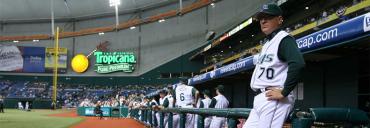
The few remaining wisps of goodwill remaining between Tampa Bay and its Major League Baseball franchise evaporated this week when team owner Stu Sternberg floated a fantasy of having his Rays split its home games with the City of Montreal.
Reaction was swift and negative with St. Petersburg Mayor Rick Kriseman, calling the hare-brained scheme “nonsensical” and a possible violation of the team’s agreement with the City of St. Petersburg. The attendance-challenged Rays currently schedule all 81 home games at St. Pete’s Tropicana Field.
MLB Commissioner Rob Manfred’s airing of such a preposterous proposal is viewed both locally and nationally as baseball’s last swing in coercing Tampa Bay taxpayers to foot the bill for a new stadium that would benefit billionaire Sternberg.
The plan -- if it can even be termed as such -- calls for playing early-season games in Florida. That supposedly would preclude the need for a domed stadium, a must in the dead of summer. But it rains in Florida and a stadium with no roof cannot be multi-use, previously the major selling point of a taxpayer-supported stadium by influence-peddling public officials.
MLB’s players’ association would have plenty to say about its membership forced to purchase/rent living space in two separate cities. And where would playoff games be played? Not in Tampa if one subscribes to the weather argument.
Kriseman asserted unequivocally that “ultimately, such a decision is up to me and I have no intention of bringing this latest idea to our city council to consider. In fact, I believe this is getting a bit silly.”
The Rays cannot explore playing any Major League Baseball games in Montreal or anywhere else prior to 2028, without reaching a formal memorandum of understanding with the City of St. Petersburg.
Reaction to Sternberg’s polyandric panacea for low attendance was fast and furious. David Hill of FanSided called a Rays permanent relocation “inevitable.”
“Baseball simply is not working in the Tampa Bay-St. Petersburg area,” Hill wrote. “Yes, the ratings are nice, but the Rays cannot survive on just television ratings alone. People need to come to the stadium and buy merchandise as well.”
USA Today opined that Sternberg’s announcement represented "a very, very bad day for baseball enthusiasts in Tampa and St. Petersburg, as their fears of regular-season, big-league baseball vanishing from their market moved from the abstract toward reality.”
Dan Schlossberg wrote in Forbes that the sharing arrangement would actually pit Tampa Bay and Montreal against each other.
“Since both Montreal and Tampa Bay need new ballparks to be competitive, the two-city concept almost sounds like a scenario for “Beat the Clock,” according to Scholssberg. Whoever builds first wins. Or so it seems, despite claims from Manfred and Sternberg that this is not an automatic mandate for relocation.”
In a Washington Examiner opinion piece entitled “Don’t let the Tampa Bay Rays screw taxpayers in two cities,” Tom Joyce wrote, “As if the benefit of taxpayer-funded stadiums had not been debunked by multiple studies and articles, this one is worse than usual.
“Economically, it’s hard to justify spending big money in either of the Rays’ proposed markets, since there isn’t much of a baseball market in either Tampa or Montreal. While the Rays’ average attendance this year is bad, it’s still higher than anything the Montreal Expos got in their final four seasons as a franchise,” Joyce wrote.
Somehow Montreal, though unable to support the Expos, always has its name in the mix of cities ripe for major league baseball and willing to fund, at least partially, new stadiums. The other names: Portland, Las Vegas, Charlotte, and Nashville.
Despite leading the wild card race in the American League, the Rays sport an average attendance of 14,546 -- second lowest in the Majors, ahead of only the Miami Marlins. Last month the Rays drew a franchise-worst 5,786 fans. The previous low was 6,509 on Sept. 5, 2017 when a hurricane was forecast.
The Rays’ opening day payroll of around $65 million was among the lowest in baseball, according to ESPN. Among the difficulty in securing a new stadium, a paucity of local revenue and a poor local-television deal, the Rays have been seen by other cities as a relocation target.
Jim Bleyer, a former reporter at the Orlando Sentinel and Tampa Tribune, writes the Tampa Bay Beat blog.


